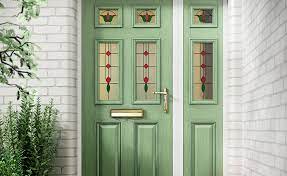Composite doors are an increasingly popular choice for homeowners due to their robustness, security, and aesthetic appeal. Let’s delve into what a composite door is, how they are made, and their various benefits.
What is a Composite Door?
Composite doors are made from a combination of materials, including wood, UPVC, foam, and Glass Reinforced Plastic (GRP). This blend of materials is chosen for its beneficial properties, resulting in a door that is strong, durable, and long-lasting.
Unlike doors made from a single material, composite doors are designed to overcome common issues like warping and reduced thermal resistance.
The core of a composite door typically consists of a solid timber section, which is surrounded by layers of materials such as uPVC and GRP, enhancing the door’s strength and weather resistance, much like this range of composite doors here.
Manufacturing Process
The process of making composite doors involves several steps. Initially, the constituent materials like wood, UPVC, and GRP are crushed into a fine powder.
This powder is then pressed together in a high-pressure machine to form the composite material. The resulting doors are generally thicker than standard UPVC doors, providing additional strength and insulation.
Benefits of Composite Doors
Enhanced Security
Composite doors are considered more secure than traditional wooden or UPVC doors due to their multi-material construction and advanced locking mechanisms. They often feature 3-star cylinders with anti-pick and anti-bump features, which significantly increases their resistance to break-ins.
Durability and Maintenance
These doors are highly resistant to weathering and are not prone to warping, twisting, or splitting. They require minimal maintenance – typically just a wipe with a damp cloth – as opposed to regular painting or varnishing needed for wooden doors.
Energy Efficiency
The high-density foam core in composite doors offers excellent thermal insulation, making them energy-efficient. This can lead to reduced heating or cooling costs in your home.
Aesthetic Appeal
Composite doors come in a wide range of styles, colors, and finishes, allowing homeowners to choose a design that complements their home’s architectural style. They can effectively mimic the appearance of wood grain, offering a natural-looking finish.
Soundproofing and Weather Resistance:
The insulation provided by the core material also helps in reducing noise transfer. Moreover, these doors are designed to withstand harsh weather conditions, making them an ideal choice for homes in areas with variable climates.
How much do composite doors cost in the UK?
Supply Only
For just the door, without installation, prices typically start from around £550 to £600 for a budget option and can go up to £1,200 to £1,400 for a top-range door with quality accessories.
Installed Price
When including professional installation, the average cost of a composite door is around £1,600. This often includes a full site survey and a custom-made door. For certain areas and premium options, this price can be higher.
Price Range for Various Designs
Prices for specific designs vary. For instance, cottage-style doors start from about £580, while more elaborate designs like the 5 Square Curved Composite Doors start from around £770.
Comparisons with Other Door Types
Composite vs. Wooden Doors
Composite doors are generally more durable, require less maintenance, and offer better insulation than wooden doors. However, wooden doors might appeal more to those who prefer a natural and traditional look despite the need for more upkeep.
Composite vs. Aluminum Doors
Both are durable, but composite doors typically offer better insulation. Aluminium doors are known for their sleek, modern appearance but may not be as energy-efficient as composite doors without special thermal breaks.
In conclusion, composite doors present a fusion of traditional aesthetics and modern functionality, making them a highly desirable choice for contemporary homes.
Their combination of security, durability, and energy efficiency, along with a wide range of design options, makes them a versatile choice for homeowners. Whether it’s the weather resistance,
the low maintenance, or the energy savings, composite doors offer significant advantages over traditional single-material doors.

